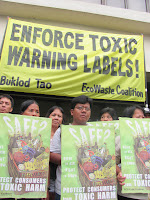EcoWaste Coalition Seeks Strict Enforcement of Toxic Warning Labels in Consumer Products
 Makati City. A non-governmental organization campaigning for consumer safety against toxic chemicals today pressed the authorities to ensure warning labels in products containing hazardous substances.
Makati City. A non-governmental organization campaigning for consumer safety against toxic chemicals today pressed the authorities to ensure warning labels in products containing hazardous substances.The EcoWaste Coalition specifically asked the Department of Trade and Industry (DTI) on the occasion of the 18th anniversary of R.A. 7394, or the Consumer Protection Act, to ensure that the labeling requirements under the law are fully complied with.
At the same time, the group called on all aspiring presidents and lawmakers to integrate into their platforms the need to uphold the basic rights of consumers such as the right to be informed and protected against exposure to hazardous substances that can cause health as well as environmental woes.
Then Pres. Corazon Aquino approved R.A. 7394 on 13 April 1992 in pursuit of the state policy “to protect the interests of the consumer, promote his general welfare and to establish standards of conduct for business and industry.”
To drive home their message, members of the EcoWaste Coalition peaceably assembled in front of the DTI headquarters in Makati City carrying colorful posters that read “right to ask, right to know, protect consumers from toxic harm.”
“While R.A. 7394 spells out certain labeling and fair packaging requirements, their enforcement leaves much to be desired, especially in common consumer products laced with toxic chemicals,” said Thony Dizon, Coordinator of the EcoWaste Coalition's Project PROTECT (People Responding and Organizing against Toxic Chemical Threats).
“The health and safety of our consumers should be in the agenda of every politico running for the May 2010 polls, particularly for presidential, senatorial and congressional hopefuls who are in the best position to push for stronger chemical safety and consumer protection laws,” he added.
In 2009, the EcoWaste Coalition, working in partnership with the Swedish Society for Nature Conservation, had samples of plastic slippers and leather shoes tested in Sweden for certain chemicals of concern.
“To our shock, most of the samples tested positive for hazardous chemicals such as endocrine disrupting phthalates and cancer-causing benzidine, to name a few, and none of them carried labels that would tell and caution consumers about their toxic contents,” Dizon said.
The EcoWaste Coalition views effective and mandatory observance of truthful toxic warning labels as a fundamental risk reduction strategy that has to be sternly enforced, while continuing the drive to remove toxic chemicals out of consumer products.
The group cited Article 91 of the Consumer Protection Act of 1992, which describes the characteristics of mislabeled hazardous substances.
According to the law, hazardous substances shall be deemed mislabeled when such substance fails to bear a label, which states conspicuously:
(i) the name and the place of business of the manufacturer, packer, distributor or seller;
(ii) the common or usual name or the chemical name of the hazardous substance or component;
(iii) the signal word "danger" on substances which are extremely flammable, corrosive or highly toxic;
(iv) the signal word "warning" or "caution" on all other hazardous substances;
(v) a clear statement as to the possible injury it may cause if used improperly;
(vi) precautionary measures describing the action to be followed or avoided;
(vii) instructions when necessary or appropriate for first-aid treatment;
(viii) the word "poison" for any hazardous substance which is defined as highly toxic;
(ix) instructions for handling and storage of packages which require special care in handling and storage; and
(x) the statement "keep out of the reach of children", or its practical equivalent, if the article is not intended for use by children and is not a banned hazardous substance, with adequate directions for the protection of children from the hazard involved.
The EcoWaste Coalition further drew attention to special packaging requirements that will protect children from serious personal injury or illness resulting from the handling and use of certain products, especially those containing harmful chemicals.
-end-





Comments
shelteredamie.blogspot.com